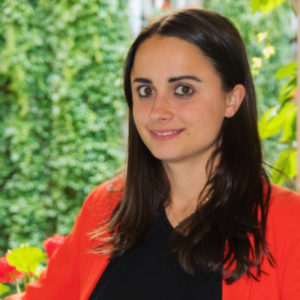Qwestion & Answer with Veronika Bondarenko, Journalist at Inman News
Qwoted is committed to exploring the current state of the media by speaking to industry leaders and educating future generations of media professionals. What has social media and technological innovation brought to the table? What can we expect for the future of journalism?
Veronika Bondarenko has been a writer for Inman News for just over three years. Her first brush with journalism took place in 2011, when she submitted an article about the dairy industry to her university newspaper at the University of British Columbia. After graduating from City University of New York with her master’s degree in journalism in 2016, she began her professional journalism career with an internship at The Jewish Daily Forward. Prior to Inman News, she has worked at DNAinfo, Business Insider and the Associated Press, where she collected data on poll results leading up to the 2016 election. After a career spent covering everything from politics and healthcare to fashion, Bondarenko writes mainly about luxury in the real estate space. She also has bylines in NBC, Yahoo News, Narratively, The Independent and Outside Magazine.
Journalism is, after all, a service – the service of finding, processing and providing information to readers.”
-Veronika Bondarenko
Which aspects of your work do you find the most challenging? The most rewarding?
VB: I always say that the best part of being a journalist is the chance to learn something new every day. What other profession lets you call up anyone in the world and ask anything you want? This ability to talk to people I would otherwise never meet and enter worlds I would otherwise never inhabit keeps me motivated, despite journalism’s many challenges. Those are not a surprise to anyone: the long hours, the instability, the pay.
What advice would you give to aspiring young writers and reporters?
VB: Keep knocking on doors and sending in those pitches. I once had an article rejected eleven times (and simply ignored by a countless number of editors I reached out to) before a magazine accepted it on the twelfth.
What learnings have made a tremendous difference in your career?
VB: A New Yorker staff writer once visited a journalism class I was taking and suggested we read not only for content but also for structure — observe how an experienced journalist forms sentences, leads into paragraphs and structures larger pieces in a way that keeps readers with you. Once you learn these basic structures (lead with a concrete example for a feature or a news hook for a breaking story, then provide the stats and reporting to show a wider problem in society), you will be able to cobble together stories out of even the most unsuccessful interviews and sparse information. Trust me on this one; it saved me many a time.
What are some of the best practices from journalism’s past that you feel need to be utilized now?
VB: Serious editing and fact-checking (the kind that once took weeks!). In a profession that attracts big egos and rewards immediacy, we often forget just how much value collaboration and a good edit can bring to a work.
The profession of journalism feels more attacked today than in a long time, but also highly necessary. Do you feel that’s true, and if so, why?
VB: While there is nothing pleasant about hearing yourself described as “the enemy of the people,” journalists were never meant to be liked. We are meant to report strong stories, ask difficult questions, find information that somebody somewhere wants covered. If we have those goals in mind, it becomes easier to process any day-to-day vitriol that comes your way.
What do you see as some of journalism’s biggest potential pitfalls? And what gives you hope for the future of journalism?
VB: This might seem like an unusual comment to make given what was just said about budget cuts and the instability of the job but still: I truly believe that there will always be a need for those who write well and process information. The formats we see use now — print, online written work, video, graphics — are just the medium and should change as technology advances and certain things become easier. The need to tell interesting stories and find information that others cannot access is what remains constant. That gives me hope, some may say a naïve one, that we can never be replaced.
POPULAR POSTS
LATEST ARTICLES
CATEGORIES

